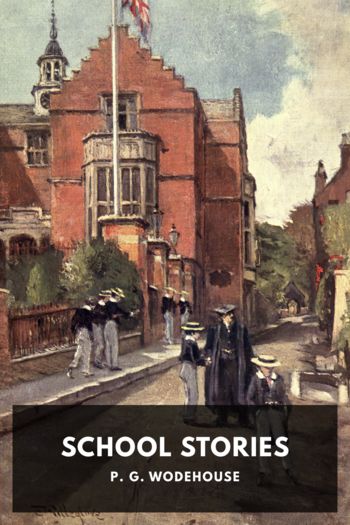School Stories by P. G. Wodehouse (children's ebooks free online .TXT) 📕

- Author: P. G. Wodehouse
Book online «School Stories by P. G. Wodehouse (children's ebooks free online .TXT) 📕». Author P. G. Wodehouse
By P. G. Wodehouse.
Table of Contents Titlepage Imprint Work Notes Now, Talking About Cricket The Tom Brown Question Bradshaw’s Little Story How Pillingshot Scored The Odd Trick L’Affaire Uncle John I II III IV V VI VII VIII IX X Harrison’s Slight Error A Shocking Affair The Babe and the Dragon The Manoeuvres of Charteris I II III IV V VI How Payne Bucked Up I II Author! “The Tabby Terror” The Prize Poem A Corner in Lines The Autograph Hunters An International Affair Part I Part II Part III Shields’ and the Cricket Cup The Politeness of Princes The Guardian Pillingshot, Detective Colophon Uncopyright ImprintThis ebook is the product of many hours of hard work by volunteers for Standard Ebooks, and builds on the hard work of other literature lovers made possible by the public domain.
This particular ebook is based on a transcription produced for Project Gutenberg and on digital scans available at the Internet Archive (Tales of St. Austins,The Swoop! and Other Stories and The Uncollected Wodehouse.
The writing and artwork within are believed to be in the U.S. public domain, and Standard Ebooks releases this ebook edition under the terms in the CC0 1.0 Universal Public Domain Dedication. For full license information, see the Uncopyright at the end of this ebook.
Standard Ebooks is a volunteer-driven project that produces ebook editions of public domain literature using modern typography, technology, and editorial standards, and distributes them free of cost. You can download this and other ebooks carefully produced for true book lovers at standardebooks.org.
WorkWith a pleasure that’s emphatic
We retire to our attic
With the satisfying feeling that our duty has been done.
Oh! philosophers may sing
Of the troubles of a king
But of pleasures there are many and of troubles there are none,
And the culminating pleasure
Which we treasure beyond measure
Is the satisfying feeling that our duty has been done.
Work is supposed to be the centre round which school life revolves—the hub of the school wheel, the lodestar of the schoolboy’s existence, and a great many other things. “You come to school to work,” is the formula used by masters when sentencing a victim to the wailing and gnashing of teeth provided by two hours’ extra tuition on a hot afternoon. In this, I think, they err, and my opinion is backed up by numerous scholars of my acquaintance, who have even gone so far—on occasions when they themselves have been the victims—as to express positive disapproval of the existing state of things. In the dear, dead days (beyond recall), I used often to long to put the case to my form-master in its only fair aspect, but always refrained from motives of policy. Masters are so apt to take offence at the well-meant endeavours of their form to instruct them in the way they should go.
What I should have liked to have done would have been something after this fashion. Entering the sanctum of the Headmaster, I should have motioned him to his seat—if he were seated already, have assured him that to rise was unnecessary. I should then have taken a seat myself, taking care to preserve a calm fixity of demeanour, and finally, with a preliminary cough, I should have embarked upon the following moving address: “My dear sir, my dear Reverend Jones or Brown (as the case may be), believe me when I say that your whole system of work is founded on a fallacious dream and reeks of rottenness. No, no, I beg that you will not interrupt me. The real state of the case, if I may say so, is briefly this: a boy goes to school to enjoy himself, and, on arriving, finds to his consternation that a great deal more work is expected of him than he is prepared to do. What course, then, Reverend Jones or Brown, does he take? He proceeds to do as much work as will steer him safely between the, ah—I may say, the Scylla of punishment and the Charybdis of being considered what my, er—fellow-pupils euphoniously term a swot. That, I think, is all this morning. Good day. Pray do not trouble to rise. I will find my way out.” I should then have made for the door, locked it, if possible, on the outside, and, rushing to the railway station, have taken a through ticket to Spitzbergen or some other place where Extradition treaties do not hold good.
But ’twas not mine to play the Tib. Gracchus, to emulate the O. Cromwell. So far from pouring my opinions like so much boiling oil into the ear of my taskmaster, I was content to play the part of audience while he did the talking, my sole remark being “Yes’r” at fixed intervals.
And yet I knew that I was in the right. My bosom throbbed with the justice of my cause. For why? The ambition of every human new boy is surely to become like J. Essop of the first eleven, who can hit a ball over two ponds, a wood, and seven villages, rather than to resemble that pale young student, Mill-Stuart, who, though he can speak Sanskrit like a native of Sanskritia, couldn’t score a single off a slow long-hop.
And this ambition is a laudable one. For the athlete is the product of nature—a step towards the more perfect type of animal, while the scholar is the outcome of artificiality. What, I ask, does the scholar gain, either morally or physically, or in any other way, by knowing who was tribune of the people in 284 BC or what is the precise difference between the various constructions of cum? It is not





Comments (0)